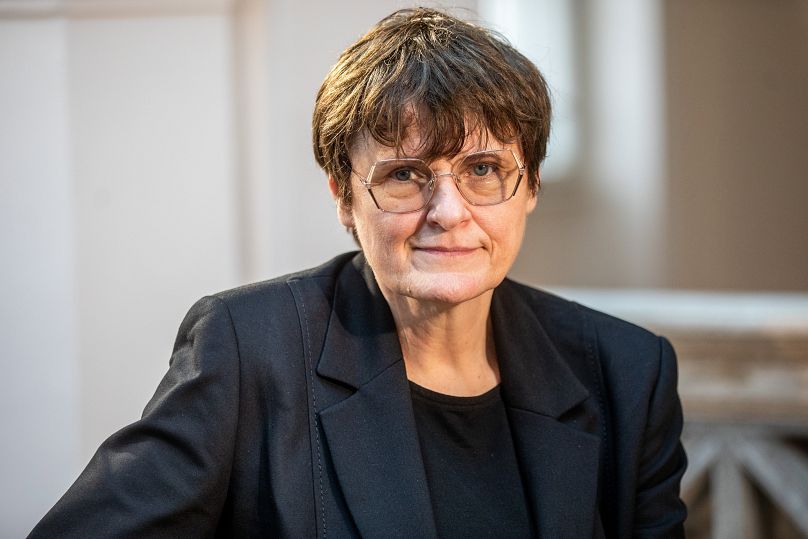Katalin Kariko fled Communist Hungary to pursue her dream of helping to cure disease. 35 years later, her past is being weaponised.
Katalin Kariko had just got her first job as a research assistant in Szeged, Hungary, in 1978 when the secret police knocked on her door.
Kariko was given a choice: agree to cooperate with the Communist state security apparatus or accept that her career in scientific research was over before it had even begun.
"I knew how the system worked, I was afraid, so I signed the recruitment document,” she said in a statement more than four decades later, on May 24, 2021.
Kariko had good reason to be afraid. After the crushing of the 1956 revolution by Soviet tanks, hundreds had been executed and hundreds of thousands of Hungarians had fled the country under the paranoid Soviet-backed regime of Janos Kadar. As well as executions, those that did not comply were often deported to the Soviet Union.
Kariko was warned that if she didn’t sign up state security would make it known that her father had been given a suspended prison sentence for his “sinful” role in the 1956 protests when a Hungarian uprising against the Communist government was brutally suppressed.
Her father was later fired from his job and was unable to work for four years.
Between 1978 and 1985, Kariko was listed as a counter-intelligence asset, tasked with identifying anyone at her institute who stole or tried to steal industrial or scientific secrets. During that time, however, she never did so.
“I never made any report and never identified anybody who was trying to steal secrets, because there were none,” she told Euronews in an email.
During her time in Hungary, Kariko never changed jobs, was never promoted, and never attended conferences or meetings overseas. She got married, had a daughter, and spent time at home raising the baby. She didn’t even socialise, spending the little time she did have working on her PhD, which she gained in 1983 at the University of Szeged.
“My prospects were bleak,” she said.
“I always wanted to do research, [to create] something that [would] cure people but wherever I was, I was always harassed [and] persecuted.”
So, in 1985, Katalin Kariko moved to the United States.
Once in America, Kariko took post-doctorates in biochemistry in Pennsylvania and Washington before taking on a professorship at the University of Pennsylvania, where she continues to teach 32 years later. Since 2013, she has also been a senior vice-president at BioNTech, which developed the Pfizer and Moderna COVID-19 vaccines.
Her field of expertise has been mRNA, also known as Messenger RNA, the technology used to develop vaccines but also to heal wounds, rebuild bones and help treat cancer. Kariko’s work has won her numerous awards and recently put her in the running for the 2021 Nobel Prize. It has also won her acclaim in Hungary, the nation she left 35 years ago.
Which was where the problems started.
On 22 May it was reported that Kariko was being made an honorary citizen of Szeged, where she first began her studies in the early 1970s. She travelled to Szeged to receive the accolade and to reminisce with former classmates about their time studying there.
While she was in Hungary, a far-right web portal, Kuruc, ran a story about her recruitment by the state security services, citing a book published in 2017. Kariko quickly acknowledged that she had been recruited and issued a statement via the media.
In it, she not only denied that she had ever informed on anyone during her time in Hungary, but stressed how the experience had driven her to leave her country to pursue her work.
Kariko was reluctant to discuss in detail her life in Hungary under the Communist regime.
“I do not plan to talk about those years, living in fear, noticing that somebody was in my apartment while I was at work, and knowing that no matter how hard I work I am [at] somebodies' mercy. [That they could] destroy me if they wish,” she told Euronews.
But she also said that the experience had driven her.
“I have been carrying out my research and activities for the last 36 years in order to heal people. Never again, no one could break me, remove me from my goals,” Kariko said.
As for the reason that a neo-Nazi and anti-Semitic news portal decided to suddenly turn on a biochemist over events that took place more than thirty years ago, Kariko can only speculate.
“The motivation could be political or more likely the act of the anti-vaccination movement. But honestly, I do not care,” she said. “I am innocent, [I] did no harm.”
“There are people who never done anything meaningful in their life, but enjoy destroying others who did.”
Every weekday, Uncovering Europe brings you a European story that goes beyond the headlines. Download the Euronews app to get a daily alert for this and other breaking news notifications. It's available on Apple and Android devices.












